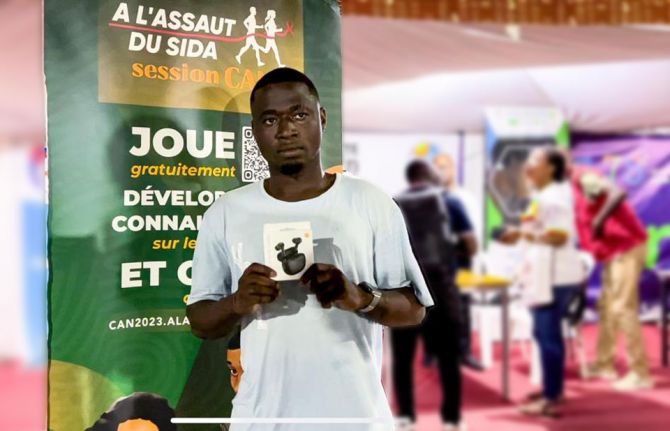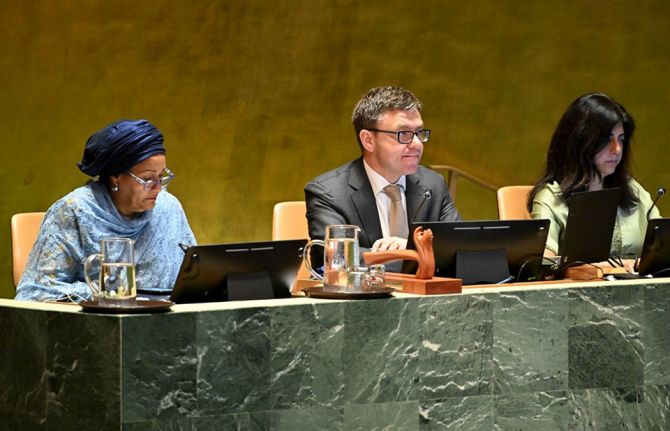
Feature Story
China province project reaches out to young people
06 septembre 2006
06 septembre 2006 06 septembre 2006The guidebooks call it ‘remote’, ‘undiscovered’ – China’s south-western province of Guizhou is home to some examples of extreme natural beauty including China’s largest waterfall, the ‘Huangguoshu’ and the Zhijin Caves, famous for their massive-scale stalagmite stone pillars.
But despite its remote location and idyllic surroundings, the province, like every other in China, is increasingly affected by HIV. From a few individual reported cases in 1993, it is currently estimated that about 37,000 people in Guizhou are living with HIV. There are signs of the epidemic becoming progressively generalized and increasingly women are becoming infected.

With hope and help – A self-help group for people living with HIV in Guizhou
A joint HIV prevention and care project, run by Guizhou provincial authorities, and UNAIDS` Cosponsor UNICEF is making some headway towards tackling the growing figures and at the same time involving people and groups from all sectors in the AIDS response. Established in 2001, the project focuses particularly on young people, tackling the often difficult issue of injecting drug use and its crossover with HIV, as well as providing care and support for people living with HIV.
“The initiative contains three key areas – development of a strategic plan on AIDS involving high-level advocacy and media mobilization; HIV prevention among children and young people in and out of school and within drug rehabilitation centres; and care and support to children living with HIV and their families,” said Christian Voumard, UNICEF Representative and chairman of the UN theme group on AIDS in China.
The project aims to build and involve all key officials and provincial groups in the AIDS response. Vice Provincial Governor of Guizhou Wu Jiafu underlines how the initiative has helped bring people together. “As government officials, we now know how we can work together with multiple sectors to confront AIDS and support people living with and affected by HIV. This network is now implementing the national policies and local policies to support young people, people living with HIV and their families to fight against the disease and its social impact,” he said.
“Though the resources here are very limited, we’re confident that we can get ahead of the HIV epidemic with the participation of all these young people and people infected and affected,” he added.
Results so far have been extremely encouraging. Provincial policies on HIV have been put in place and training sessions with authorities and project managers are already underway. Since the project’s inception, 45 high schools have developed curriculum on HIV and drug use prevention in eight of the province’s prefectures, reaching more than 70,000 children and young people.
Voluntary testing and counselling services have been set up within seven drug rehabilitation centres across the province.
“By knowing my HIV status and with all the knowledge of prevention of HIV, I will stop sharing needles with my friends and engaging in high risk sex,” said one young man at the Tongren prefecture drug rehabilitation centre.
Through the initiative, gradually people living with HIV are being brought to the forefront of the response in the province. A number of self-help groups of people living with HIV have been developed with the participation of 50 people living with HIV. More than 100 family members and 26 children and their families participated in care and support campaigns in the prefectures of Guiyang and Tongren, receiving community based care for family life and schooling.
“I never imagined it could be possible that authorities and big organizations would care about us –people living with HIV—and our children,” said one man living with HIV from Tongren prefecture who has been involved in the programme. “I lost my hope because of the pain of disease, social discrimination and poverty, but this is helping to restore the hope by supporting me and my children.”
UNICEF was the first major donor on AIDS in Guizhou province and provided some of the ground work for other donors’ work in the area. Programmes supported by the US Center for Disease Control and the Global Fund to Fight AIDS, TB and Malaria (Round 4) have since benefited from this in their support to Guizhou.
UNICEF will continue to support the project in their new 2006-2010 programme and activities will be expanded to include prevention of mother to child transmission of HIV (PMTCT) and increasing care and support for children affected by AIDS.

The joint project in Guizhou is focusing particularly on young people
“This programme has been an example of bringing together a variety of different groups within the AIDS response – and crucially invovles young people and people living with HIV,” said UNAIDS Country Coordinator for China, Joel Rehnstrom.
“We are seeing the project help reduce numbers of new infections, as well as break down the barriers and taboos of involving people living with HIV – which in turn is breaking down stigma and discrimination related to HIV.”
UNAIDS Executive Director Peter Piot is visiting China from 7 – 12 September to encourage continued leadership and commitment and to mobilize a truly multi-sectoral response to AIDS in China. As part of his visit, Dr Piot is participating in a three-day mission to Guizhou, visiting the Hui Long community and Zhijing County. Dr Piot will meet with representatives of provincial government and city leaders and visit various key sites that focusing on HIV and drug use.
Related links
UNICEF China website
More on China



